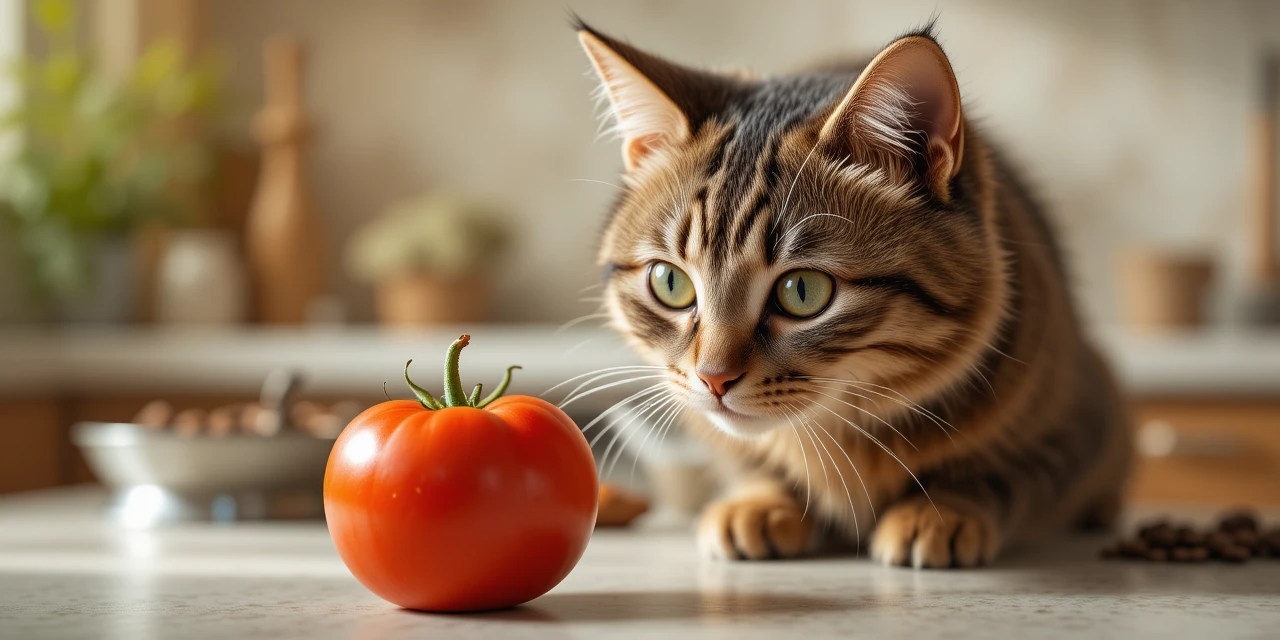Can Cats Eat Tomatoes? What Every Cat Owner Needs to Know
Have you ever wondered if your curious feline can safely nibble on those bright red tomatoes in your kitchen? Cats are known for their unpredictable eating habits, and as a responsible cat owner, understanding what’s safe for them to eat is crucial. Tomatoes might seem like a harmless snack, but are they really good for your cat? Let’s dive into everything you need to know about cats and tomatoes to keep your furry friend safe and healthy.
Quick Answer (TL;DR)
Yes, cats can eat ripe tomatoes—but only with caution. While ripe tomatoes in small amounts are generally safe for cats, green tomatoes, stems, and leaves contain solanine, a toxic compound that can harm your cat. It’s important to avoid these parts entirely and never feed your cat tomato-based processed foods like ketchup or sauces.
Understanding Tomato Toxicity in Cats
What Is Solanine?
Solanine is a natural toxin found in certain plants of the nightshade family, including tomatoes. This toxin is most concentrated in the green parts of the tomato plant—such as unripe (green) tomatoes, leaves, and stems. Solanine can interfere with your cat’s nervous system and digestive tract, making these parts dangerous.
Symptoms of Toxicity
If your cat accidentally consumes solanine, watch for symptoms such as:
- Excessive drooling or foaming at the mouth
- Vomiting and diarrhea
- Weakness or lethargy
- Dilated pupils and difficulty walking
- Loss of appetite
If you notice any of these signs, contact your veterinarian immediately.
Risk Factors
Even small amounts of green tomato parts or plant material can cause toxic reactions, especially in kittens, elderly cats, or cats with existing health problems. Always err on the side of caution and keep these away from your pet.
Safe Consumption Guidelines
Ripe Tomatoes
Fully ripe tomatoes (bright red, soft, and fragrant) have very low levels of solanine and are generally considered safe in small amounts as an occasional treat. However, tomatoes should never replace a balanced cat diet.
Preparation Tips
- Remove all green parts: stems, leaves, and any unripe tomatoes.
- Wash the tomato thoroughly to remove any pesticides or dirt.
- Cut the tomato into small, manageable pieces to avoid choking hazards.
- Introduce tomatoes slowly and watch your cat for any adverse reactions.
Feeding Frequency
Tomatoes should only be offered as an infrequent treat, not a regular part of your cat’s meals. Their diet should primarily consist of high-quality cat food designed to meet their nutritional needs.
Dangers of Tomato-Based Products
Processed tomato products like tomato sauce, ketchup, canned tomatoes, and soups often contain added ingredients such as salt, sugar, garlic, onions, and spices that can be harmful or even toxic to cats. Avoid feeding your cat any processed tomato products, as they pose greater health risks than fresh tomatoes.
Alternative Safe Treats for Your Cat
If you want to treat your cat safely, consider these cat-friendly options:
- Small pieces of cooked pumpkin
- Steamed carrots
- Blueberries or small amounts of strawberries
- Cucumber slices
- Commercially available cat treats specifically formulated for feline health
These alternatives offer safe variety without the risks associated with tomatoes.
What to Do If Your Cat Eats Tomato Parts
Immediate Actions
If you suspect your cat has ingested green tomatoes, stems, or leaves—or processed tomato products—contact your veterinarian or an emergency pet poison hotline immediately. Early intervention is critical to prevent serious illness.
Avoid Home Remedies
Do not attempt to induce vomiting or administer home treatments without professional guidance. Your vet can provide the safest and most effective care.
Conclusion
In summary, ripe tomatoes in small quantities can be a safe and occasional treat for cats, but green tomatoes, stems, leaves, and processed tomato products should always be avoided due to toxicity risks. Always prioritize a balanced diet tailored for cats and consult your vet before introducing new foods. Keeping your curious feline safe requires vigilance, knowledge, and responsible feeding.
Frequently Asked Questions (FAQs)
Q: Can kittens eat tomatoes?
A: It’s best to avoid feeding tomatoes to kittens, as their digestive systems are more sensitive to toxins.
Q: Are cherry tomatoes safe for cats?
A: Only if fully ripe and fed in moderation, but always remove green parts. Treat cherry tomatoes the same as regular tomatoes.
Q: What should I do if my cat shows symptoms after eating tomatoes?
A: Contact your veterinarian immediately for advice and possible treatment.


